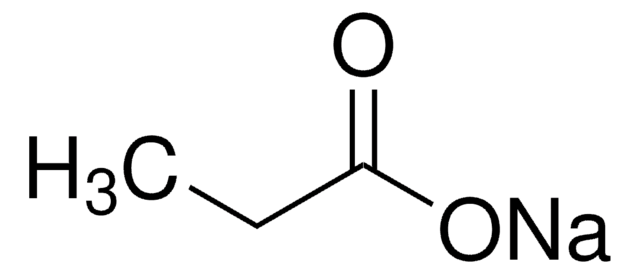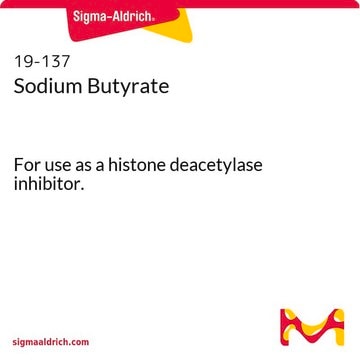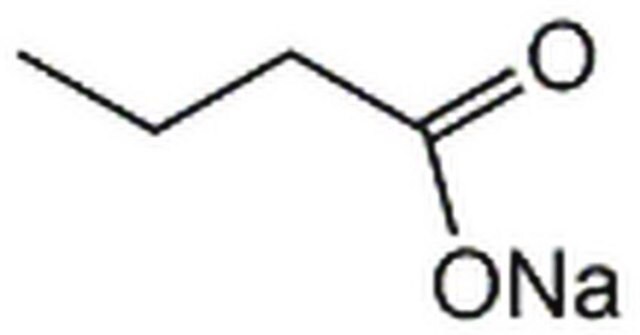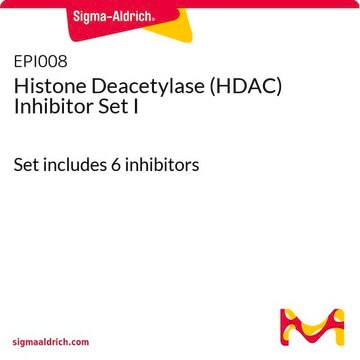おすすめの製品
使用法
100 assays in 96 well plates
NCBIアクセッション番号
輸送温度
dry ice
保管温度
−20°C
遺伝子情報
human ... HDAC3(8841)
mouse ... HDAC3(15183)
詳細
Histone deacetylases (HDACs) are a large family of enzymes that remove acetyl groups from histone proteins. Site specific histone acetylation and deacetylation have been shown to activate or repress eukaryotic gene transcription, respectively, and as a consequence, HDACs play a crucial role in mammalian development and disease. HDACs are involved in important biological activities, such as cell differentiation, proliferation, apoptosis, and senescence. Of the several classes of HDACs, this kit assays a member of the zinc-independent, NADH requiring class, HDAC3. With Sigma′s HDAC3 Inhibitor Screening Kit, HDAC3 Enzyme acts with the supplied Developer to deacetylate and then cleave the HDAC3 Substrate [Arg-His-Lys-Lys(Ac)-AFC]. This activity releases the quenched fluorescent group, AFC, which can be detected at Em/Ex=380/500 nm. In the presence of a HDAC3 inhibitor, AFC is not released and its fluorescence remains quenched. The kit provides a rapid, simple, sensitive, and reliable test, suitable for either individual tests or high throughput screening of HDAC3 inhibitors. Trichostatin A (TSA) is included as a control inhibitor to compare with the efficacy of test inhibitors.
特徴および利点
- Simple, sensitive, and reliable assay
- Simple procedure; takes ~60 min
- Utilizes fluorometric methods
- Sample type: candidate HDAC3 inhibitors
- Suitable for screening HDAC3 inhibitors
- Suitable for individual tests or high throughput assays and kinetic studies
- Convenient 96-well microplate format
その他情報
The kit is shipped on dry ice. Store HDAC-3 enzyme at -80 °C upon receipt. All other components should be stored at -20 °C, protected from light. All -20 °C reagents should be used within 2 months after thawing.
関連製品
製品番号
詳細
価格
保管分類コード
10 - Combustible liquids
WGK
WGK 3
引火点(°F)
188.6 °F - closed cup
引火点(℃)
87 °C - closed cup
適用法令
試験研究用途を考慮した関連法令を主に挙げております。化学物質以外については、一部の情報のみ提供しています。 製品を安全かつ合法的に使用することは、使用者の義務です。最新情報により修正される場合があります。WEBの反映には時間を要することがあるため、適宜SDSをご参照ください。
毒物及び劇物取締法
キットコンポーネントの情報を参照してください
PRTR
キットコンポーネントの情報を参照してください
消防法
キットコンポーネントの情報を参照してください
労働安全衛生法名称等を表示すべき危険物及び有害物
キットコンポーネントの情報を参照してください
労働安全衛生法名称等を通知すべき危険物及び有害物
キットコンポーネントの情報を参照してください
カルタヘナ法
キットコンポーネントの情報を参照してください
Jan Code
キットコンポーネントの情報を参照してください
最新バージョンのいずれかを選択してください:
Q Yang et al.
Cell proliferation, 46(6), 654-664 (2014-01-28)
Pulmonary arterial hypertension, characterized by pulmonary vascular remodelling and vasoconstriction, is associated with excessive proliferative changes in pulmonary vascular walls. However, the role of HDACs in the phenotypic alteration of pulmonary arterial smooth muscle cells (PASMC) is largely unknown. Pulmonary
Yong Wang et al.
Circulation research, 114(6), 957-965 (2014-01-31)
Our previous study has shown that yes-associated protein (YAP) plays a crucial role in the phenotypic modulation of vascular smooth muscle cells (SMCs) in response to arterial injury. However, the role of YAP in vascular SMC development is unknown. The
Bihua Bie et al.
Nature neuroscience, 17(2), 223-231 (2014-01-21)
Amyloid-induced microglial activation and neuroinflammation impair central synapses and memory function, although the mechanism remains unclear. Neuroligin 1 (NLGN1), a postsynaptic protein found in central excitatory synapses, governs excitatory synaptic efficacy and plasticity in the brain. Here we found, in
Astrid M Kral et al.
Biochemistry, 53(4), 725-734 (2014-01-24)
Histone deacetylases (HDACs) play diverse roles in many diseases including cancer, sarcopenia, and Alzheimer's. Different isoforms of HDACs appear to play disparate roles in the cell and are associated with specific diseases; as such, a substantial effort has been made
Ji Heon Noh et al.
Cancer research, 74(6), 1728-1738 (2014-01-23)
Aberrant regulation of histone deacetylase 2 (HDAC2) contributes to malignant progression in various cancers, but the underlying mechanism leading to the activation of oncogenic HDAC2 remains unknown. In this study, we show that HDAC2 expression is upregulated in a large
ライフサイエンス、有機合成、材料科学、クロマトグラフィー、分析など、あらゆる分野の研究に経験のあるメンバーがおります。.
製品に関するお問い合わせはこちら(テクニカルサービス)







